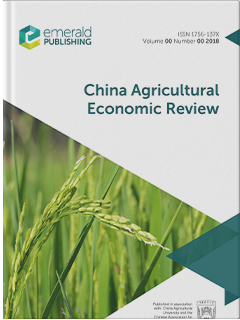土地证制对撂荒的影响:来自中国农村的证据
IF 4.6
2区 经济学
Q1 AGRICULTURAL ECONOMICS & POLICY
引用次数: 4
摘要
目的通过估算土地认证对耕地撂撂率的影响、机制及其在省、社区和家庭层面群体间的异质性效应,探讨土地权属制度在农业生产过程中对土地数量的保护作用。为了解决潜在的同质性问题,作者利用2017年和2019年中国29个省份15,000户家庭的全国代表性面板调查数据,以及时变的差异中的差异和倾向得分匹配-差异中的差异模型,研究了土地认证对撂撂地面积的影响。findingland认证在农业生产过程中对土地数量的保护作用显著,它使废弃农田面积减少了至少4%。这种效果主要是通过改善土壤肥力、促进土地流转、增加农业补贴和提高农业收入来实现的。然而,虽然土地认证有利于非主产区和西部地区的农民,平原、偏远和非政治中心村的农民,以及没有经历过土地流转或土地调整的农民,但对其他人却没有好处。在后疫情时代,以保护耕地数量为基础的粮食安全变得越来越重要。合理利用每一寸耕地,加强土地权属制度改革,遏制耕地撂荒现象是现实和必然的,特别是在土地权属不稳定的情况下。影响农民撂荒的因素多种多样,如土壤肥力差、土地流转难、农业补贴过少、农业收入过低等,但根本原因是土地权属不安全。来自中国农村的经验证据表明,明确的产权界定和有效的产权保护有助于遏制撂荒现象。通过土地证制改革增强农民的土地保护行为,促进土地的可持续利用,是土地权属制度改革的应有之处。耕地作为粮食生产的物质载体和禀赋基础,对保障国家粮食安全具有重要意义,特别是在后疫情时代。现阶段,大多数发展中国家仍需加强土地权属制度建设,进行土地权证改革,向农民发放界定明确、具有法律效力的土地权证。同样重要的是,在中国和其他发展中国家完成土地认证改革后,还应努力促进认证成果的多样化利用。在快速城市化进程中,征占耕地是保护土地数量的必要措施,减少农业生产过程中的耕地撂荒也是必要措施;因此,它值得密切关注。为此,本研究通过估算土地审定制度对撂荒耕地面积的影响,考察其可能产生的机制,识别其异质效应,检验产权理论在中国情境下的适用性,丰富相关文献,为其他发展中国家在不同情况下深化土地权属制度改革,加强土地数量保护提供中国证据。本文章由计算机程序翻译,如有差异,请以英文原文为准。
The impact of land certification on cropland abandonment: evidence from rural China
PurposeThis study explores how the land tenure system helps in protecting land quantity during agricultural production by estimating the influence of land certification on cropland abandonment, its mechanisms and its heterogeneous effects among groups at the provincial, community and household levels.Design/methodology/approachTo deal with potential homogeneity concerns, the authors investigate the impact of land certification on the area of abandoned croplands using nationally representative panel data from the 2017 and 2019 China Rural Household Panel Survey on 15,000 households across 29 provinces and time-varying difference-in-differences and propensity score matching-difference-in-differences models.FindingsLand certification significantly contributes to the protection of land quantity during agricultural production, and it reduces the area of abandoned croplands by at least 4%. This effect is mainly achieved by improving soil fertility, promoting land transfer, increasing the availability of agricultural subsidies and raising agricultural income. However, while land certification benefits farmers in nonmajor grain-producing areas and western regions, in plain, remote and nonpolitically central villages, and farmers who have not undergone land transfer or land adjustment, it is not beneficial for others.Research limitations/implicationsIn the postepidemic era, food security based on the protection of the amount of cultivated land becomes increasingly important. It is realistic and inevitable to rationally use every inch of cultivated land and curb the cropland abandonment by strengthening land tenure system reform, especially in the case of the insecurity of land tenure.Practical implicationsThere are various factors affecting farmers' cropland abandonment, such as poor soil fertility, unavailable land transfer, too little agricultural subsidies and too low agricultural income, but the root cause is the insecurity of land tenure. Empirical evidence from rural China has shown that a clear definition and effective protection of property rights can help curb the cropland abandonment. Enhancing the land protection behavior of farmers through the reform of land certification and promoting the sustainable use of land are what the reform of land tenure system should be.Social implicationsCultivated land, as the material carrier and endowment basis of grain production, is of great importance to safeguarding national food security, especially in the postepidemic era. At the present stage, it is still necessary for most developing countries to strengthen the construction of land tenure system, to carry out land certification reform and to issue farmers with clearly defined and legally effective land certificates. Equally important, efforts also should be made to promote the diversified utilization of the achievements of the certification after the completion of land certification reform in China and other developing countries.Originality/valueExpropriation and occupation of croplands are essential in protecting land quantity during rapid urbanization, and so is reducing cropland abandonment during agricultural production; therefore, it deserves close attention. In this regard, this study estimates the impact of land certification on the area of abandoned croplands, examines its possible mechanisms and identifies its heterogeneous effects to test the applicability of the property rights theory in the Chinese context and enrich the relevant literature and provide Chinese evidence for other developing countries to strengthen the protection of land quantity, by deepening the reform of the land tenure system under different circumstances.
求助全文
通过发布文献求助,成功后即可免费获取论文全文。
去求助
来源期刊

China Agricultural Economic Review
AGRICULTURAL ECONOMICS & POLICY-
CiteScore
9.80
自引率
5.90%
发文量
41
审稿时长
>12 weeks
期刊介绍:
Published in association with China Agricultural University and the Chinese Association for Agricultural Economics, China Agricultural Economic Review publishes academic writings by international scholars, and particularly encourages empirical work that can be replicated and extended by others; and research articles that employ econometric and statistical hypothesis testing, optimization and simulation models. The journal aims to publish research which can be applied to China’s agricultural and rural policy-making process, the development of the agricultural economics discipline and to developing countries hoping to learn from China’s agricultural and rural development.
 求助内容:
求助内容: 应助结果提醒方式:
应助结果提醒方式:


